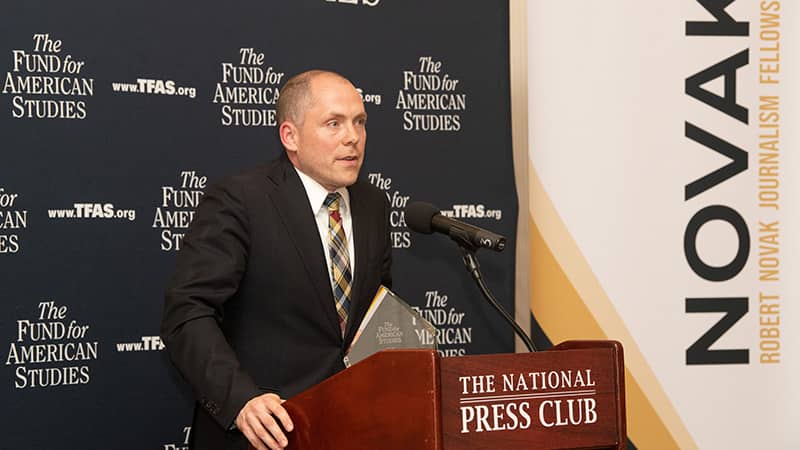
TFAS alumnus Tim Carney, Novak ’03, has encountered success not only as one of the first authors to report on the intersection of business and government, but also as an opinion writer for numerous outlets and a guest on a variety of news stations. A 2003 Robert Novak Journalism Fellow, he is now a Resident Fellow at the American Enterprise Institute and a senior political columnist at the Washington Examiner.
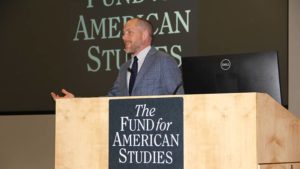
As a direct result of his Novak Fellowship, Carney has authored three books: “The Big Ripoff: How Big Business and Big Government Steal Your Money,” “Obamanomics: How Barack Obama Is Bankrupting You and Enriching His Wall Street Friends, Corporate Lobbyists, and Union Bosses,” and “Alienated America: Why Some Places Thrive While Others Collapse.”
An acclaimed author and journalist, Carney has remained involved with TFAS by speaking to undergraduate students and volunteering with our programs year-round. In 2019, TFAS selected Carney to receive the Kenneth Y. Tomlinson Award for Outstanding Journalism.
Discovering His Passion
Despite writing for his hometown and high school papers since he was 14 years old, Carney didn’t realize he wanted to be a journalist until the end of college. All throughout high school and college, he wrote articles on local news, sports and politics, but he had his sights set on a different goal – becoming a senator, or even the president of the United States.
One day however, his older brother called him and said, “You know, Tim, you spend all your time writing – you clearly love it. I love what I do too. But the difference between you and me is that I’m getting paid to do what I love.”
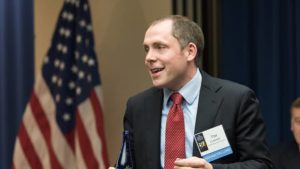
That phone call flipped a switch for Carney. He realized for the first time that he could pursue a career in journalism. He landed an internship at the National Journalism Center (NJC) after he graduated from college and joined the NJC full-time shortly thereafter. However, Carney was still unsure of which topics he was passionate about covering.
Carney still recalls the day he discovered his passion. His NJC boss called him into the office and asked if he had heard of the government agency Export-Import Bank. Carney hadn’t, so he dove headfirst into researching it and analyzing its operations. As he learned more, Carney realized that this project had sparked something inside him. He made it his mission to find where else business and government intersect because he learned that wherever that occurs, corruption is likely to exist. This angle meshed well with Carney’s beliefs and helped him hone his researching and writing skills, which were foundational to his success.
This was just the beginning of his career as a government and business writer. He has since built up a sizable portfolio, and nearly 20 years later, has published three books and countless articles in a variety of outlets on this topic.
The Impetus of Journalistic Success
When Carney participated in the Novak Fellowship in 2003, it was a full-time job for him. He learned where, when and how he writes best (in his room with a cup of coffee before the sun comes up). He became immersed in researching and writing and was able to accomplish a significant amount of writing since the Fellowship afforded him ample time to focus.
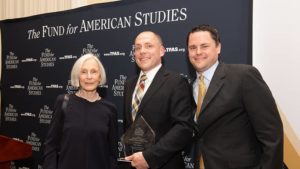
The Novak Fellowship prepared Carney for his career in many ways. He learned how to pace himself while writing, determined how to structure his day and discovered his journalistic strengths and weaknesses. The program allowed him to be productive and prolific, and it taught him how to set himself up for success, which he hadn’t learned in college or early in his career.
In addition to these lessons, the Fellowship made it possible for Carney to publish his first book based on his project, “Regulatory Robber Barons.” When he first sent out the proposal, more than 20 publishers rejected him. This mountain of rejection was difficult, but almost expected – Carney was extremely young, unknown, and was writing about something no one else had covered before. When a publisher finally accepted his proposal, he knew his hard work had paid off and he felt overjoyed.
Carney sees his time as a Novak Fellow as the impetus of his success and is grateful because of the role it played in every journalistic venture he undertook.
“The Fellowship was the single most important building block in my career,” Carney shared. “Without it, I wouldn’t have published books, gotten a column at the Washington Examiner, been selected as a Resident Fellow at AEI or been hired for many of the jobs I’ve had. Every aspect of my career is an aftershock of the Fellowship.”
The Fellowship was the single most important building block in my career…. Every aspect of my career is an aftershock of the Fellowship.” – Tim Carney, Novak ’03
Carney’s Advice to Others
Due to his newfound passion and the success of his first book, Carney continued to research and write about business and government, a topic in which he quickly established himself as an expert. While becoming an expert in a topic may sound daunting, Carney believes anyone can do it. He advises eager journalists to do their research, to really put in the effort to dive deep and construct factual arguments, if they too want to become experts.
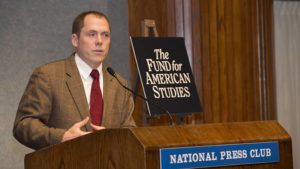
“If you dive deeply into a topic and you really research it, you can quickly become one of the experts on the topic,” he said. “If you know how to learn, you’re curious and you work hard, you can become an expert in any topic that interests you.”
Carney also encourages aspiring journalists to just write, even if what they write is going to be thrown away.
“You’re going to write a lot of pieces that will get thrown out, but that doesn’t mean you shouldn’t write them,” Carney said. “You can’t skip writing the parts that will get thrown out, because those are the parts that will make you a better writer.”
Carney recommends the Novak Fellowship for two primary reasons: it taught him the power of facts in an increasingly strained media environment, and it teaches the research skills that are the key to success in the world of journalism.
The Novak Fellowship allows you to dive deeply into a subject and give your readers new information they wouldn’t have gotten otherwise. Though I am an opinion writer, I have always believed in the power of facts. The Fellowship gives you time to learn, research, travel and talk to people to create insightful and well-researched pieces.” – Tim Carney, Novak ’03
“Especially today, our media environment is incredibly fast-paced with quick turnaround, so you don’t really have time to dive in,” he said. “The Novak Fellowship allows you to dive deeply into a subject and give your readers new information they wouldn’t have gotten otherwise. Though I am an opinion writer, I have always believed in the power of facts. The Fellowship gives you time to learn, research, travel and talk to people to create insightful and well-researched pieces.”
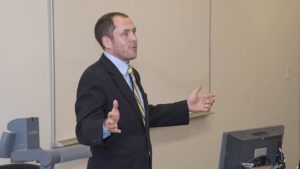
One of the people who taught Carney to value objectivity and truth was his mentor, Robert Novak. Carney wants to drive home what the Fellowship’s namesake believed: “If you want to succeed – whatever success looks like to you – you have to research and present facts that people don’t already know.”
He says his and Bob Novak’s stories are those of “fierce pursuit of the truth, regardless of what the tides and the public culture may say. That is the legacy of Bob Novak, and that is why I pray for TFAS and for the Novak Fellowship to keep doing what they’re doing to produce more of this for generations to come.”

